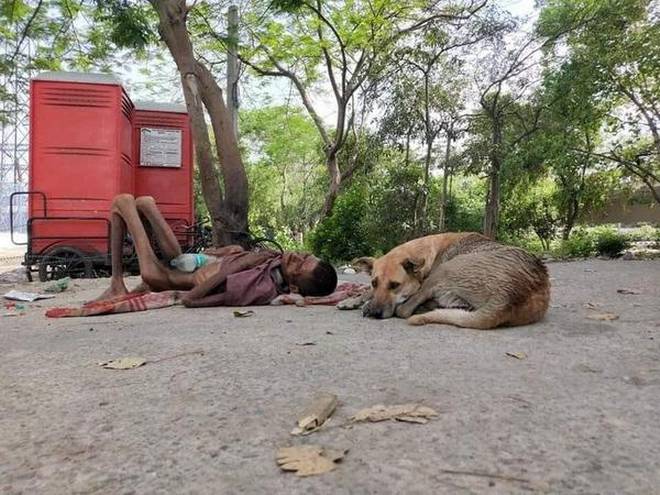The other day I saw a beggar who did not know how to beg. I was in my local market in an unfashionable middle-class Delhi neighborhood. As I was loading my grocery purchases in my car near a tiny supermarket, I heard a tentative “Madamji”. That’s when I noticed the man sitting on the curb in the desolate street.
He asked softly if I could give him some food. He sounded so hesitant and tentative that I got the sense that he was new at this. I asked him whether he wanted food to cook or food that was ready to eat. My mind was racing and I thought that if he had nowhere to cook, I would give him bread and cheese, although that would certainly not be a traditional meal for him. He said he could cook. I asked where he lived, and he said in a shanty nearby. Was his family here or back in his village? He said they were all here.
I went back into the store and bought him two kilos of rice and a packet of soy nuggets. I explained how to cook the soy. He broke down, thanking me profusely and wishing me a lifetime of blessings. He broke down because I had bought Rs 300 (about $4) worth of food for his family.
On my previous grocery-shopping round too, a disabled boy in ragged clothes had approached me, begging for flour and rice. I bought him a couple of oranges, which he accepted, but he repeated his entreaty for flour and rice. I enquired how he would cook them, and he eagerly assured me he had a home. I asked where, and he named a nearby neighborhood that people like me politely describe as “low-income”.
The reality is that such neighborhoods are home to people who are oppressed because of their caste, faith or gender. Many of these people are dirt-poor and earn precarious livelihoods. I bought the child two kilos each of flour and rice. I thought maybe people in his family have lost their livelihoods in the lockdown.
My friends say they are glad I was there for these starving people. The fact is: I was there that day. A week or two weeks later, I cannot be sure they are okay. I cannot imagine the terror of the ongoing lockdown – is it a colonial hangover that we’re using the word “curfew” interchangeably? – for people who used to earn a living, no matter how humble, and who now have to beg.
Often, we hear middle-class Indians urging others not to give anything to beggars, because they’re part of a “begging racket”, implying that begging is organized crime. And yet, nobody has ever come across evidence of such a racket. Even people who have studied the lives of beggars say they have heard of no such thing. So why do we choose to believe that begging rackets exist, and that what is right in front of our eyes is not actual desperation?
In India’s version of the Covid-19 pandemic, hunger is as much of a tragedy as the disease itself, even in a relatively well-administered city like Delhi. Among the hardest hit are migrant daily wage earners, unemployed people, and the homeless. This video, shot on April 18 in Delhi, shows people waiting for food in a two-kilometer-long queue in the scorching sun:
State and local governments, faith groups, volunteer groups, and non-profits are trying to provide food to such people. But 26 days into India’s lockdown, it is obvious that many are still falling through the cracks. Stories about attacks on, and deaths of, the poor are surfacing with increasing frequency.
For example, 29-year-old Gangamma, a migrant construction worker, was forced to leave Bangalore when work came to a halt. After walking 300 kilometers, she died of hunger on her way home to Raichur. Mukesh, a house painter in his early thirties, in Gurgaon, near Delhi, sold his cellphone for Rs 2,500 ($33) to buy flour, sugar, rice, and a fan for his four children so that they could sleep comfortably in the rising heat – and then ended his life. His neighbors pitched in for his last rites, because his family had no money. Sudarshan Rasal, a 49-year-old taxi driver in Mumbai, died of acute respiratory distress after being turned away by eight hospitals. Despite coming from a locality officially declared a Covid-19 hotspot, Rasal remained undiagnosed, because doctors cannot take a swab from a dead man.
The image below, of a starving man, was taken near the Yamuna river in North Delhi on April 15, by Sunil Kumar Aledia, whose Facebook profile identifies him as convenor of the National Forum for Homeless Housing Rights:

There are two parallel Indias at the best of times, but the Covid-19 pandemic is making it harder and harder to avoid what we pretend not to see most of the time. One India is missing its maids and drivers, virtue-signaling about paying them through the lockdown, rediscovering the kitchen, and cheerfully taking on the challenge of trying to recreate from its limited pantry the taste of that amazing crepe they had that one time at that tiny creperie in Paris. The other India is trying desperately not to die.
Tomorrow I plan to go out to buy essentials. I don’t expect to find the coffee filters or vanilla extract that I “need”. But I think I’ll be okay.
New Delhi, April 20, 2020
(Photo Credit: Facebook / Sunil Kumar Aledia)